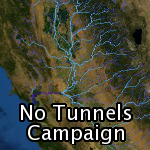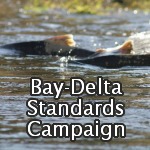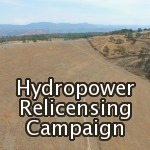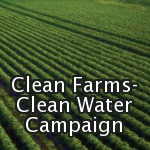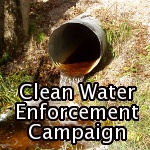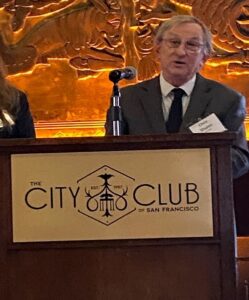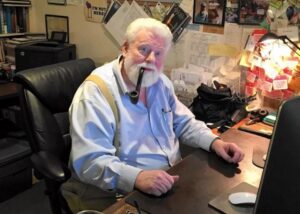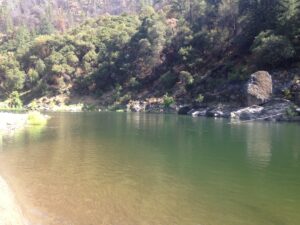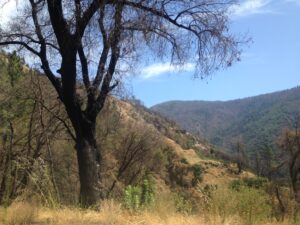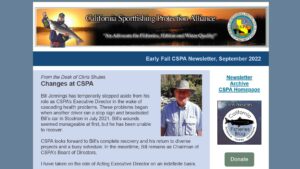With nary a mention that the center of the prospective deal is no flow increases on the Yuba River, two fish agencies, a water agency, and the Newsom Administration used glowing words to announce on May 16, 2023 “a restoration plan” for the Yuba River.
The rollout at a press conference[1] featured the Director of the California Department of Fish and Wildlife (CDFW), the California Assistant Regional Administrator for the National Marine Fisheries Service (NMFS), the General Manager of Yuba Water Agency (YWA), the California Resources Secretary, and Governor Newsom himself.
Later in the day came the price sticker for fish. The “non-binding” “Term Sheet” that summarizes the plan negotiated solely by CDFW, NMFS, and YWA announced among its “Guiding Principles”:
“Measures will not require changes to the 2008 Yuba Accord instream flow requirements as described in the Final Environmental Impact Statement (June 2019) for the YRDP, except as otherwise agreed to by YWA in the Settlement Agreement.”
The Final Environmental Impact Statement refers to the relicensing by the Federal Energy Regulatory Commission (FERC) of YWA’s Yuba River Development Hydroelectric Project. In that regulatory process, CDFW staff joined staff from non-governmental organizations (NGOs) and the US Fish and Wildlife Service (USFWS) in advocating for substantially more aggressive flow requirements in most years. On May 16, 2023, the managers of CDFW and NMFS announced their deal next to the river whose flow needs they just sold out.
During the press conference, Resources Secretary Wade Crowfoot set a new standard for greenwashing in discussing the Administration’s efforts to “restore flows in our rivers” during a press conference that announced a deal whose cornerstone was not increasing flow requirements in the Yuba River. He followed it up by mentioning several environmental and fishing groups that had nothing to do with the Yuba deal.
Speaking in a broader context, Governor Newsom explained his approach “doesn’t mean we’re rolling over people.” Well here’s a newsflash from under the bus. His agencies cut a backroom deal without so much as informing other Yuba advocates, including other federal resource agencies and water and power purveyors as well as non-governmental organizations (NGOs), until after the deal was done. The deal stands directly in opposition to 10 years of flow advocacy by the Foothills Water Network coalition of NGOs, including California Sportfishing Protection Alliance (CSPA), as well as by CDFW and USFWS staff.
This “DAD” approach (decide, announce, and defend) has become standard operating procedure for the Newsom Administration’s water initiatives. His “state team” has deployed the same tactic in ginning up “Voluntary Agreements” that decide how little water they can call “increased flow” with a straight face. For the lower Yuba River, the latest proposed Voluntary Agreement (separate from the deal announced May 16) would require YWA to release an additional 7000 acre-feet a year (above the flows required by FERC), in a watershed whose average annual runoff is 2.4 million acre-feet. That’s a whopping increase of three tenths of one percent. Other water agencies will pay YWA to release another 43,000 acre-feet in most years. Well, it’s an increase. Like the “tall” coffee at Starbucks that’s the smallest cup in the house, it’s all about branding.
Just to make sure all bases are covered, the Term Sheet also says:
“The Parties intend to negotiate a Settlement Agreement that would … provide the SWRCB [State Water Resources Control Board] with an agreed-upon set of conditions for consideration in issuance of any necessary Section 401 water quality certification in the new FERC license proceeding for the YRDP.”
On May 15, 2023, the California Department of Justice received word from the US Supreme Court that it, along with CSPA, Friends of the River, South Yuba River Citizens League, and the Sierra Club, had successfully defended – against an appeal by Yuba Water Agency, no less – the State Water Board’s authority to issue a water quality certification at all. That means the State can order additional flows to protect fish. No matter. One day after the Board and its legal representatives concluded three years of pleadings and litigation in defense of its authority, CDFW’s Director Chuck Bonham announced, alongside the Governor, that CDFW had agreed to a deal. Part of that deal is that CDFW will recommend that the Board not use its authority to order additional flows.
That would be the bus’s back set of wheels. Will the State Water Board finally decide that it doesn’t like the view from under the bus either?
Fish Passage Promises and Omissions
The prospective ‘gets’ in the Yuba surrender are improved, volitional fish passage past Daguerre Point Dam, located at River Mile 11.4 on the lower Yuba River, and a “Reintroduction Plan” with some as yet undefined level of support for a pilot reintroduction, and eventually a long-term reintroduction, of spring-run Chinook salmon to the North Yuba River.
Daguerre Point Dam
Fish passage at Daguerre Point Dam has problems.
The two fish ladders on the dam have variably passable hydraulics depending on flow and changes in the river channel. The ladders are subject to clogging by sediment, wood, and other debris. Salmon often choose to hold downstream of the ladders for days or weeks rather than pass up the ladders. The ladders do not allow sturgeon to pass upstream.
The fish screen on the Hallwood-Cordua Diversion that begins on the north side of the dam directs juvenile salmon and steelhead migrating downstream into pipes whose outlets below the dam create feeding halls for striped bass. The Brophy or Southside Diversion on the south side of the dam has no fish screen; a series of berms and ponds does a poor job of keeping juvenile salmon and steelhead out of the canals that the diversion feeds.
Downstream fish passage over the dam is a crapshoot. If fish survive the drop, they must still run a gauntlet of stripers in the pool below.
The Army Corps of Engineers owns Daguerre Point Dam. Its maintenance record is poor. The Corps has been dragging its heels about improving or replacing the fish passage facilities at the dam for decades. Improvements to the dam itself would require Congressional approval and appropriations. Yet neither the Corps nor Congress has ever developed an active champion for improving the structure of even for improving the maintenance of the dam.
Fixing these problems would be a good thing. However, the press conference statement by Chuck Bonham that “even in the best of times, it’s a very difficult barrier for salmon and steelhead moving upstream”), and NMFS’s Cathy Marcinkevage’s characterization of passage for salmon as “incredibly challenging,” overstate the degree and extent of the problem facing salmon and steelhead moving upstream. Notwithstanding Ms. Marcinkevage’s press conference assessment that passage improvements at Daguerre “will open up up to 12 miles of habitat for sturgeon, steelhead, and spring-run Chinook salmon,” almost all the salmon and steelhead that spawn in the Yuba River already spawn in the reach upstream of Daguerre Point Dam.
Sturgeon are a different matter, but there is a huge wrinkle that no one is talking about. The jumps on the Daguerre fish ladders, which block passage for sturgeon, also block passage for striped bass, many of which presently collect in the pool at Daguerre’s foot. There is also a sizeable run of American shad on the lower Yuba River. Compared to striped bass, shad are equally if not more efficient in eating juvenile salmon, steelhead, and rainbow trout. The Daguerre fish ladders also block the upstream passage of shad.
Today, Daguerre Point Dam serves as a separation weir, keeping stripers and shad out of the upper 12 miles of the lower Yuba River. This separation gives juvenile salmon, including ESA-listed spring-run Chinook, a chance to rear and grow without threat of being eaten by stripers until the salmon move downstream of Daguerre. For juvenile steelhead, which live at least one year in fresh water before migrating to the ocean, separation also provides over-summering habitat that is free of the presence of stripers and shad. And perhaps most important to anglers, separation provides many miles of outstanding fishing for (mostly) resident rainbow trout upstream of Daguerre Point Dam. Combined with the lower Yuba River’s cold water, separation by Daguerre Point Dam has made the upper reach of the lower Yuba River a destination fishery for steelhead and trout anglers from all over the state.
For every sturgeon that a new completely volitional fishway past Daguerre Point Dam allows to pass, it is reasonable to assume that there will be hundreds or likely thousands of stripers and shad that also pass. Absent mitigation, the lower Yuba River may well become like the lower American River in Sacramento, where the summer fisheries are shad and stripers, and where a resident trout fishery is virtually non-existent.
CDFW, NMFS, and YWA’s managers don’t seem to have considered that there might be a problem with a “completely volitional” passage solution at Daguerre Point Dam. There may be a solution, such as a weir, that could partly or fully mitigate the problem. Such a solution may come out in the necessary environmental review process that the Governor generally disparaged at the press conference; he doesn’t seem to consider that CEQA can improve as well as shut down projects. He also doesn’t seem to consider that applying special rules for the application of CEQA to “environmental” or “beneficial” projects assumes agreement on net benefits, and that his administration’s initiative or blessing does not assure the absence of significant environmental impacts.
Reintroduction of salmon to the North Yuba River
Another consequence of a few managers going off in a room and deciding what’s best for a river, and then announcing to the world why everyone is going to love it, is that it sours or perhaps ends working relationships with the people and entities who thought they were collaborating as equals but who turned out to be less equal than others.
At the instigation of NMFS and CDFW, a number of entities who had previously participated in the “Yuba Salmon Partnership” began discussions in 2020 aimed at establishing a pilot reintroduction of spring-run Chinook salmon to the upper Yuba River watershed. In 2021, these entities did outreach and expanded their numbers. They chose a name, the Yuba Reintroduction Working Group. They established a steering committee consisting of representatives of the USDA Forest Service, US Fish and Wildlife Service, Placer County Water Agency, Nevada Irrigation District, PG&E, American Rivers, South Yuba River Citizens League, and CSPA, in addition to NMFS, CDFW and YWA.
In November 2021, the Steering Committee adopted a charter, whose key action statement said:
“The focus of the Yuba Reintroduction Working Group (YRWG) will be to contribute to the recovery of spring-run Chinook salmon through planning and evaluating their reintroduction into historical habitat in the upper Yuba River watershed, defined as all forks and tributaries of the Yuba River upstream of Englebright Dam.”
The decision to use the term “upper Yuba River watershed” and to not predetermine any location for reintroduction was a deliberate choice tied to engaging as many key stakeholders as possible. Some had concerns about introducing salmon in their (figurative) backyards, i.e., areas where on some level they have responsibilities. Some had concerns about not introducing salmon in their figurative backyards. Some entities assumed that volitional passage was not feasible; others thought that a pilot program could inform habitat suitability in diverse places, which might keep more options (including volitional ones) open. It was, in short, a carefully worded delicate balance whose key was inclusion.
Yuba Water Agency, with the approval of NMFS and CDFW, trampled that balance with the May 16 release of the “Draft Framework North Yuba River Spring-Run Chinook Salmon Reintroduction Plan.” It’s there, fittingly, in black and blue letters: North Yuba it is. Neither the term sheet nor the press conference provided stated dollar amounts for the reintroduction plan or how much YWA will contribute to it. But the principle is clear: the funding (and the work) are directed at the venue of choice.
This is the corporate model of collaboration. Collaborators get to collaborate in implementing the details of the program the senior managers have chosen. There is no question who’s in control. There is little chance for an alternative approach, since priorities for implementation and funding will now be directed within the four corners of the official program.
By Way of Conclusion
As CSPA told the Los Angeles Times, “They’re blowing a lot of sunshine on a deal that in my opinion gives up far too much in terms of flow in the lower Yuba River.” CDFW and NMFS surrendered on a flow-for-passage deal that Yuba Water Agency has wanted and that CSPA has vigorously opposed for over a decade.
In addition to the collateral damage to relationships, the top-down decision making has landed on a plan for fish passage at Daguerre Point Dam that if not modified has a good chance of destroying one of the best recreational fisheries in the state.
CDFW Director Chuck Bonham stated at the press conference, “[W]e can either keep these fights alive, which California is infamous for on water, or we can sit down and actually do something.” The top-down decision-making, on the contrary, may in the context of upstream Yuba River fish passage rekindle old water fights where détente or better had previously been reached. And the imperative to “do something” does not and can never mean giving up on the flows that salmon and other fish need.
[1] https://twitter.com/CAgovernor/status/1658529741778079746?cxt=HHwWhMDSwemApIQuAAAA



